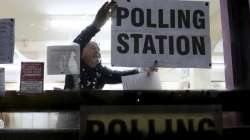British Indians could be important swing voters if a snap election is held in UK: Report
The report “Britain’s New Swing Voters? A Survey of British Indian Attitudes,” is a collaboration between the Carnegie Endowment for International Peace and Johns Hopkins University School of Advanced International Studies.

If a snap election is held in the UK tomorrow, British Indians could be important swing voters, a new report has said, explaining that around four in ten community members identify with the Labour Party, while three in ten support the ruling Conservative Party.
The report “Britain’s New Swing Voters? A Survey of British Indian Attitudes,” is a collaboration between the Carnegie Endowment for International Peace and Johns Hopkins University School of Advanced International Studies.
The study analysed a new, nationally representative online survey of 792 British Indian eligible voters— the Survey of British Indian Attitudes (SBIA) — conducted between July 30 and August 16, 2021.
The authors of the report are Caroline Duckworth (Carnegie Endowment for International Peace), Devesh Kapur (Johns Hopkins-SAIS), and Milan Vaishnav (Carnegie Endowment for International Peace).
According to the report on Thursday, British Indians demonstrate a modest preference for the Labour Party, but the latter’s historical advantage has eroded.
“Around four in ten British Indians identify with the Labour Party, while three in ten support the Conservative Party and around one in ten identifies with smaller, third parties. However, related survey evidence suggests that there is a clear deterioration in British Indians’ support for the Labour Party,” it said.
"If a snap election were held tomorrow, British Indians could be important swing voters," it said.
According to the report, among British Indians, Labour enjoys a 10-percentage-point advantage over the Conservatives in a hypothetical general election, but a significant minority (15 percent) is undecided.
“While Labour has lost ground over the last decade, the Conservatives have not consistently been the beneficiary. Data suggest support for the Conservative Party has plateaued and a rising share of respondents support third parties or are undecided,” it said.
The report notes that a majority of Muslim and Sikh respondents, and a plurality of those with no religious affiliation, would support the Labour Party in the event of a snap election, lining up behind them in large numbers. However, a plurality of Christians and Hindus reports a preference for the Conservative Party, albeit by smaller margins, it said.
Just 37 per cent of British Indians approve of Boris Johnson’s performance as Prime Minister. In a hypothetical general election, Labour leader Keir Starmer emerges as the most popular prime ministerial choice. Close on his heels, however, is Chancellor of the Exchequer Rishi Sunak, a British Indian whose popularity outshines that of Johnson or fellow British Indian Cabinet minister Priti Patel, said the report.
“Although Indian Prime Minister Narendra Modi enjoys limited support from the diaspora, Conservative Party supporters and Hindus are the most upbeat about his job performance.
"When it comes to foreign policy, few British Indians rate UK-India relations as a top political issue. Most do not have strong views on the Johnson government’s India policy, and do not perceive any party with an advantage in the stewardship of the UK-India relationship,” said the report.
ALSO READ: UK terror threat level raised to ‘severe’ after hospital blast terrorism incident